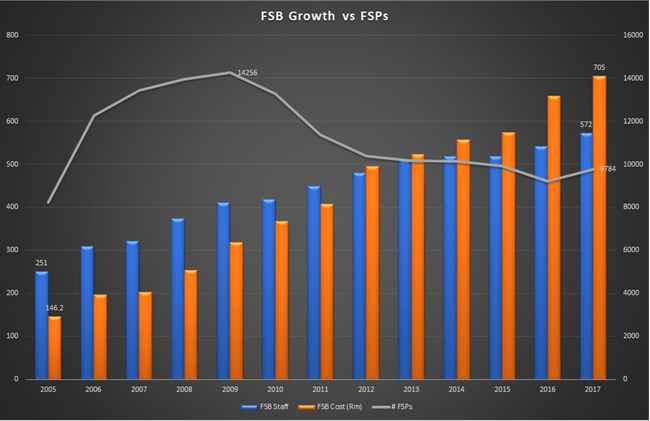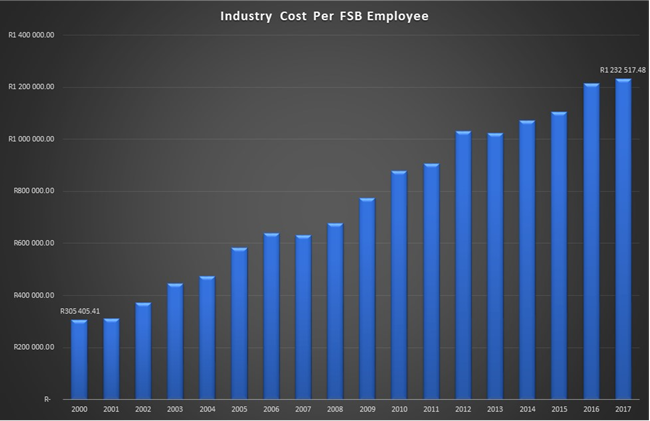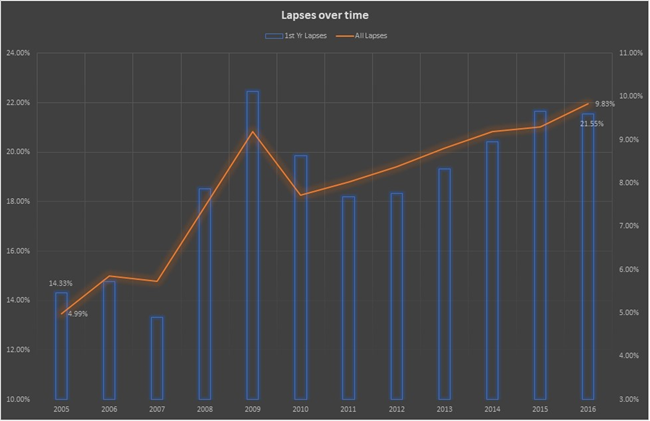Media release
26 March 2018
Far from protecting consumers, the Financial Advisory and Intermediary Services (FAIS) Act and Twin Peaks cost billions and add nothing
Paying more to get less
FAIS, effective in 2004, was supposed to be a significant advance in protecting unsuspecting consumers from ‘rogues’ in the Financial Services sector who were ‘mis‐selling’ unsuitable insurance policies and causing a high lapse rate (when a policy is not renewed or is discontinued). Evidence shows that FAIS failed in this objective: lapses have doubled since 2004, and compliance measures and increased product prices cost the industry and consumers billions while depriving customers of innovative new products. This is according to Robert Vivian, Professor of Insurance at the WITS School of Economics & Finance speaking at a Free Market Foundation (FMF) briefing.
FAIS was the forerunner of the now in force Twin Peaks (TP), which extends FAIS into a complex, costly and bureaucratic regulatory system for the banking sector. WATCH: Twin Peaks – how Treasury will cost SA an additional R4,8bn per year http://bit.ly/2G2aiJO. The Financial Services Board (FSB) has yet to provide an objective and measurable purpose for Twin Peaks.
Vivian said, “In terms of its proclaimed purpose, FAIS is an obvious failure. However, like so many pieces of legislation, the original purpose of FAIS has long been forgotten. It is now an entirely immeasurable and thus purposeless piece of legislation that has acquired a life of its own.”
According to Vivian, the supposed problems did not exist in the first place but were the excuses used as a means of introducing ‘arbitrary, regulatory, bureaucratic, managerial centralism’ or rule by ‘unelected officials’ rather than by the rule of law according to the judicial and Parliamentary process. Nevertheless, a complex, hugely expensive system of regulation of the financial services industry has evolved.
The evidence clearly shows how wrong the original reason was as the lapse rate increased after FAIS. Vivian says the implications go far wider than notional consumer protection. The system introduced by FAIS, and now extended by Twin Peaks, attacks the basis of the law of contract and undermines property rights.
Vivian says that, “For years the FSB has violated the rule of law, at every turn riding roughshod over the rights of financial intermediaries (brokers) and making them pay a significant share of the FSB’s ever‐escalating costs. FSB management and other costs have skyrocketed. Costs per FSB employee have quadrupled and now average over R1,2 million p.a. per employee, with the CEO being paid nearly R600,000 per month, excluding benefits and freebies.”
The FSB ‘explanation’ that Twin Peaks will prevent another banking crisis is baseless. The legislation does not contain a single provision that could prevent either a local or a global ‘banking crisis’. The FSB claimed that a ‘draconian and intrusive system’ with unlimited powers of intervention was required with the effect that un‐elected and un‐accountable regulators would be able to interfere in the running of private financial institutions, paid for by levies on institutions, stealthily passed on to their consumers. Treasury’s own conservative estimate of Twin Peaks costs is between R4.8bn and R6bn per annum.
Surprisingly, neither the media nor the public appear to understand or even care. They should, says Vivian, because the model adopted by the FSB and the growing body of regulatory powers that bypass the scrutiny of parliament and the judiciary, sets a dangerous precedent and takes society into an era not seen in 200 years of successful regulation by common law and the law of contract. The FSB (now to be the FSCA) is a law unto itself with the ability to accuse, judge and fine banks and insurance companies, then keep the funds for their own use. This, says Vivian, run foul of the rule of law and, disturbingly, attacks contract law which is the foundation of all commercial transactions. It also creates precedent for legislation that has no measurable purpose.
FMF executive director Leon Louw said, “Since FAIS was first mooted in 1998, the FMF has registered its profound concern that it would prove a hugely expensive folly, bound to fail by all objective measures. The evidence shows that it has indeed been one of the most expensive legislative failures in South African history. Today, the financial services sector is an industry weighed down by regulation, compliance burdens and unnecessary interference. The losers are, as always, consumers who pay more to get less.”
The real motivation remains a mystery and Vivian and other experts can only conclude that the primary motivation by the FSB and Treasury is to create a vast bureaucratic empire with themselves at the top.
Ends


